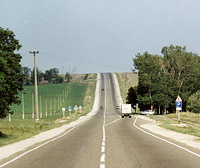You may agree that it’s not that pleasant to find out from a German magazine, to which your country’s Prime Minister Serge Sargsyan has given an interview, that he has intentions to run for president in 2008. Of course, Robert Kocharyan has frequently been saying that he’s going to support Sargsyan during the presidential elections. The fact that Kocharyan went to the RPA office right after the parliamentary elections couldn’t mean anything else. (I think it’s a Karabakh phrase to say, “The right word goes to the donkey”). And history shows that the candidate who has the support of the incumbent government always takes the helm of the country.
Therefore, we may state that at least right now, in our country, nothing interesting or unpredictable is going to happen. And, in Armenia, things are so predictable that there is no sense to wait for some spontaneous or unexpected processes, which will stop the mentioned scenario from taking place (unless of course we consider the immortality of the president or the government). The saddest thing in this story is that the presidential elections in Armenia have not only been predicted months or even years ago, but that nothing new is going to happen. The most remarkable occasions or things which happen to our average citizens still remain the birthdays and funerals of their friends and relatives. And after each birthday or funeral people start to discuss where else the MPs or government officials are besides the government building or NA, and, in fact, that these places are quite far away and cold. However, to be honest, we shouldn’t forget that the most legitimate MPs are the oligarchs, who were able to buy the votes of citizens and get elected.
Recently I was speaking to a clergyman. He honestly confessed that during the parliamentary elections has voted for the Republicans, and among the majoritarian candidates he had voted for MP Seyran Saroyan. “There was no great choice. I should have either voted for Seyran Saroyan or Hakob Hakobyan. So I chose the first candidate.” The impression that we received when speaking to the clergyman was really shocking. It turns out that this educated person, with a broad mental horizon, didn’t choose the least of the bad. It is understandable when the oligarchs are elected by a crook or by the people, even intellectuals, who feed themselves by the stack of the 100 USD bank notes of the oligarch. However, when the clergyman is in the secret polling place, where it’s only him and God and his conscience, and makes a decision to vote for Saroyan, it surprises us a lot. We really get surprised how the clergyman could vote for Saroyan, whose congratulatory reception as an MP was held in the lobby of the Parliament, no part of which related to legislation at all. Perhaps you remember that Saroyan has preferred to use the archaic words “mmz ppz”(a slang response to an insult), which you can’t find in any biblical writing. The venerable clergyman wasn’t able to answer these questions.
And the country elected by our clerical and economical elite (by their own will) has slowly turned into a marsh. If you go back and review any of the archives of the mass media of Armenia you will see that the most breaking thing the media is speaking about is the rallies before the election, which get settled down right after elections. If our country is ever mentioned anywhere, then it’s done in a few lines of some international monitoring organization. And those relate to the leading ratings of Armenia regarding the dependence of the media on government, regression of democracy, dissemination of poverty, increase of corruption, etc. These reports are as a rule followed by several local seminars. The incessantly repeated opinions of the same speakers in different press clubs around the same issues have already depressed us.
Even the articles about Armenia, which appear in the Russian media and which are mainly ordered by certain people, are so exotic for us that all the respected media agencies of Armenia think about referring to those articles. The local statesmen express opinions about those. For example, how important is it to speak about the promise of Russia’s deputy prime-minister, Sergey Ivanov, which he has given to Robert Kocharyan? The promise was given to provide the transport of the 10 tons of Armenian apricots to Russia through the port of Poti. The circulation of this kind of media coverage is both boring and primitive.

